-
New York Film Festival 2018
Last edited by Chris Knipp; 04-05-2020 at 11:15 PM.
-
SORRY ANGEL/PLAIRE, AIMER ET COURIR VITE (Christophe Honoré 2018)
CHRISTOPHE HONORÉ: SORRY ANGEL/PLAIRE, AIMER ET COURIR VITE (2018)
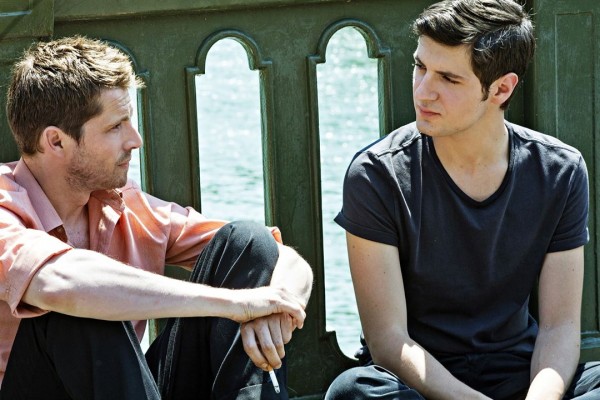
PIERRE DELANDANCHAMPS AND VINCENT LACOSTE IN SORRY ANGEL
Gay in France in the age of AIDS
Sorry Angel was released in French theaters 10 May 2018 with its Cannes premiere and received a very high rating from French critics (AlloCiné 4.2).This is Honoré's most overtly autobiographical film yet, in which he returns to what he has called "les jours sinistres et terrifiants" - the grim and terrifying days - of his youth, the two last decades of the previous century. This is the story of young gay man who comes to Paris from the provinces to become a filmmaker. The director, who later learned he was HIV-positive, steps aside from his glamorous muse Louis Garrel here, shifting to the young comic actor (doing serious this time), Vincent Lacoste, as his alter ego. This is Honoré's eleventh feature and he has tried a variety of things, mostly personal, but never overtly gay, or confronting the harsh world of AIDS in the Nineties before. There is ample poetry and more humor, but a different tone and braver stance than he has previously achieved - perhaps a new maturity, certainly a greater honesty. Mostly a series of big, standalone set pieces separated by memorably used music, Sorry Angel is a lot to take in. It is a contrast, perhaps consciously so, to Robin Campillo's tumultuous AIDS and ACT UP-FRANCE film, BPM (Beats Per Minute) - NYFF 2017. This is a French picture of coming of age in the Nineties world of AIDS, for sure, but a personal and private not an activist one. There is no ACT UP scene, little talk of activism.
He really has two other alter egos in the film, himself at two other, later stages of life, and they are all connected, though tenuously, somewhat sadly, in a narrative of frustrated love. Besides the young Arthur Prigent (Lacoste), who decides to leave Rennes, in Brittany, to try his fortune writing and making films in Paris, there is Jacques Tondelli (Pierre Deladonchamps of Stranger by the Lake - NYFF 2013), a thirty-something novelist and playwright who has AIDS. He and Arthur cruise each other in a cinema in Rennes showing Joan Campion's The Piano Player. Pierre is there momentarily for the production of a play. Arthur is smitten.
The third, oldest alter ego is Mathieu (film actor and Comédie-Française member Denis Podalydès), Pierre's neighbor, an Honoré of an age he has yet to reach, a character no doubt smitten by Pierre too, but the two are just intimate friends. For much of the film Pierre and Arthur aren't together, or even in the same town. But when Arthur moves to Paris they are, even though Pierre tries to avoid Arthur, because by then he has become seriously ill, and wants to avoid another love affair, because now it is too late. He tries to have Mathieu lie to Arthur and say he's out of town, but he hasn't the heart. And Arthur, touchingly, stays around, undeterred by Pierre's illness. Honoré spares us the grimmer aspects of AIDS illness; Pierre never stops looking good, or having well-coiffed hair. But the physical is not glamorized: as the Les Inrocks reviewer Serge Kaganski says, Honoré excels here at showing the "intriguing osmosis between the sweetness of sex and its crudity," and this is one of the film's memorable aspects. Honoré is boldly willing to, as Peter Debruge says in his Cannes Variety review, admit the "inherent clumsiness of gay sex" willing to show gay men who "fumble and disappoint one another in bed."
Kaganski calls this Honoré's most successful film since Love Songs (R-V 2008). It does strike a remarkable balance between the demanding and the mainstream, as Kaganski says. There is ugliness, intelligence, charm, wit, and a portrait of an era that avoids generalization or cliché.
The film jumps around a bit in time, more than halfway through showing Arthur as running a little summer camp for kids, the playful cruising scene of him and Pierre in the cinema early on. In a bittersweet and playful scene Arthur tells his best friends he is moving to Paris. When he does come and Pierre tries to hide from him but then can't, Mathieu reports to Pierre that Arthur's first projects are to visit the Pompidou Museum (it shows him doing so) and attend an ACT UP meeting - which to him, Mathieu snidely says, may be something exotic "like visiting the catacombs." Pierre tries to avoid the dire case of his now dying ex-lover Marco (Thomas Gonzalez), but has two sensual moments with the two of them in the bath, one real, one imaginary.
Vincent Lacoste is a funny guy. When he appears on the popular French show "On n'est pas couché" people seem to start laughing before he even opens his mouth, and he has an infectious laugh himself. Here, he gets to display a sweet, humane, loving side and extend his chops. But his good humor is felt too, and needed in a story clouded by the tragedies of gay AIDS deaths or their imminence. It's an effort of the film to avoid being gloomy or maudlin while remaining honest. On the whole Honoré skillfully steers in between. Deladonchamps is a somewhat distant, neutral actor, partly because he is so brave in representing the unflattering side of his characters. Podalydès' character is low-keyed and relatively minor (if sometimes hilarious). This makes the naive, generous Arthur come forward even though he's rarely at the center of the action, and we never see him do whatever he does, write, make films, though we do see that he has had a girlfriend, Nadine (Adèle Wismes), just as Jacques has a son, Loulou (Tristan Farge), and a friendly relationship with Loulou's mother (Sophie Letourneur), whom he shares Loulou with 50-50. This makes Sorry Angel as indirect in some ways as Honoré's more beautiful, imaginary films like Love Songs, Dans Paris, or La belle personne, which are partly celebrations of Louis Garrel, a dreamy, straight actor playing straight roles less directly connected to Honoré's own life than the leads here. Nonetheless Sorry Angel is a kind of "coming out" for him, if far from militant or confessional. There are moments of physicality and sex that are pretty blunt, without being graphic.
It's rather remarkable that Honoré brings all these contrasting elements and moods together into an artistic whole, with some sequences that show his innate cinematic gifts, and particularly a splendid sense of how to use music in a film, as well as a rich background of French pop of the Nineties local audiences will best appreciate. In the end though, on first viewing, it was hard to get my head around it all, or know what to feel. But it still impressed, and my admiration for Honoré remains as strong as ever.
Honoré also writes novels and plays (little known to anglophone fans), and a related theater piece by him, Les Idoles, about notable men who died of AIDS in the Eighties and Nineties, was recently presented at the Théâtre de l'Odéon in Paris.
Sorry Angel/Plaire, aimer et courir vite, 132 mins., debuted in Competition at Cannes, May 2018. Screened for this review as part of the New York Film Festival, 30 Sept. 2018. To be distributed in the US by Strand. Metascore 75. As mentioned, French critical rating much higher, AlloCiné 4.2 (based on 20 reviews). At the NYFF public screening, Lacoste and Honoré were present for a Q&A, and Lacoste did not fail to show his fey humor, or Honoré his eloquence and honesty.
Last edited by Chris Knipp; 02-27-2019 at 10:51 PM.
-
Private life (tamara jenkins 2018)
TAMARA JENKINS: PRIVATE LIFE (2018)
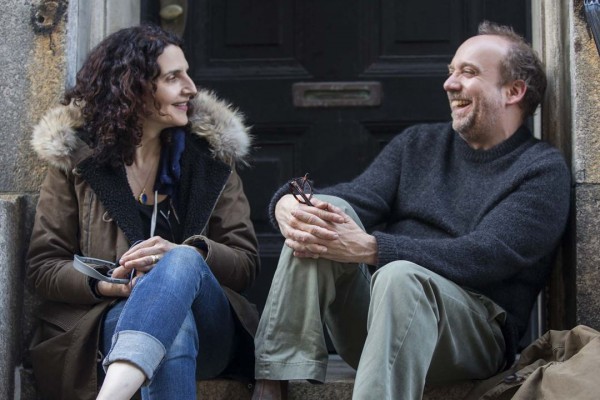
KATHRYN HAHN AND PAUL GIAMATTI IN PRIVATE LIFE
A brutal and overly realistic satire of middle-class, middle-aged New Yorkers trying to have a baby
Critical response has been mostly positive to this 5 October Sundance-Netflix release, Tamara Jenkins' first since her 2007 The Savages. It concerns a very bourgeois New York intellectual couple entering middle age whose relationship is pushed to the edge by the writer wife's struggle to get pregnant via fertility treatments. Wider recognition of the film may be limited, however, as Oswen Gleiberman suggested in his Variety review, for two reasons: Netflix ownership may make its theatrical life very limited, and people who have not struggled with fertility treatments to have a child may have trouble relating.
I have not, and I did have some trouble. Jenkins seemed to pump up the shocks - or was it just that the reverb of the overloud sound in the theater distorted every crinkled paper bag or line of dialogue? The underlining was unnecessary. The couple's sufferings were intense enough. The result was to turn a narrative already hovering between the Kafkaesque and the deadly dull into a horror movie. All the while one knows it's meant to be funny, and sometimes there are indeed laughs. But every moment is so belabored, Jenkins lacks the slightest lightness of touch. She reportedly took ten years to bring this movie to fruition - another prolonged, abortive effort like the one depicted. Though deeply informed on its subject, Jenkins' film just seems to meander on and on. It might have worked better as a mini-series.
This has been compared to Noah Baumbach's The Squid and the Whale (NYFF 2005), likewise a "very New York" story much celebrated at a New York Film Festival. Dave Erlich praised this film in his Sundance Indiewire review for not dwelling on intellectual snobbism in depicting its New York intellectual couple despite their accomplishments and their hip East Village dwelling. So what? The Squid and the Whale may be as self-satisfied as Jeff Daniels' smug writer father trumped by his ex Laura Linney and the awkwardness may outweigh the laughs, but Baumbach's film had broader implications than this one.
As the story begins, in medias res, 41-year-old Rachel (Kathryn Hahn, mostly appealing) and 47-year-old Richard (Paul Giamatti, serviceable as ever) are undergoing a procedure at a Manhattan fertility clinic where he masturbates and the resulting sperm is transferred to her by medical technicians. He is shown pornography he doesn't respond to, and later it turns out he has ejaculated but produced no sperm. He has only one testicle. They look into adoption, and at the same time pursue what medical experts say is their only remaining option of having a child that's genetically in part their own. That is using the host egg of a young woman that's then impregnated with Richard's sperm and transferred to Rachel's uterus to be raised to term. But the egg won't be hers, and Rachel doesn't like this idea. All these things require painful and expensive shots.
A new development arrives when Rachel and Richard unexpectedly take in a step relative's daughter who has withdrawn from college, Sadie (Kayli Carter). Sadie brings a welcome note of energy and enthusiasm, and so does the actress. Sadie wants to live in New York and her hosts soon arrive upon the idea that the fertilized egg could be hers, an idea she readily - no doubt too readily - takes to. After much hesitation and awkwardness and the shocked opposition of Sadie's mother, they go ahead with this, with Sadie too now receiving the painful and expensive shots. But as has been obvious for some time, this couple is on a highway to nowhere, and the ending is unsatisfying. While this film clearly appealed to the friendly New York Film Festival debut audience, its downbeat aspects, as well as a focus on white privilege that now feels passé, will make it a long slog for many.
Private Life, 127 mins., which debuted at Sundance Jan. 2018, also showed 1 Oct. in the New York Film Festival, where it was screened for this review. It opens in US theaters 5 Oct. 2018 (at IFC Center, NYC) and simultaneously on the Internet (Netflix). Metascore 78.
Last edited by Chris Knipp; 10-02-2018 at 11:02 AM.
-
NON-FICTION/DOUBLES VIES (Olivier Assayas 2018)
OLIVIER ASSAYAS: NON-FICTION/DOUBLES VIES (2018)
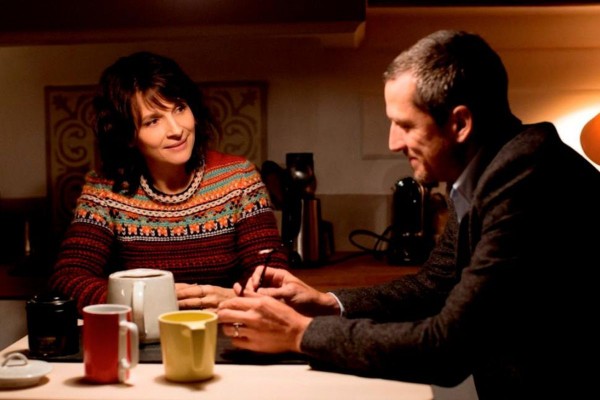
JULIETTE BINOCHE AND GUILLAUME CANET IN NON-FICTION
A midlife-crisis comedy of adultery set against a changing French publishing world
Whether it is called Non-Fiction or the more resonant Double Lives, Olivier Assayas' energetic new film is a sharply edited, very smart, very French non-stop intellectual farce full of debates and speculations about the rapidly changing worlds of old and new media. Print may be dying out - but is it? Children and old people love to read books, except retirees prefer E-books - cheaper, lighter weight and with the option of larger print. Do people read any more? Are Tweets the epigrams of today? Twitter, the Internet, E-books (narrated by celebrities), blogs, "fake news," are constantly being discussed.
Meanwhile husbands and wives and lovers and mistresses must be juggled, and this is done with the same dexterity and sangfroid one would bring to business deals or politics. And by the way, do politicians ever have the public in mind or just power and money? And are publishers interested in content or only in commodities? In Double Lives (now emerging as the English title), which debuted at Venice and showed also at Toronto, Assayas considers the state of print in the digital age from the point of view primarily of his two couples, who dance around each other.
Alain (Guillaume Canet) is an old-fashioned print publisher (though he is constantly toying with going electronic). Selena (Juliette Binoche), Alain's wife, is a busy actress on popular TV. Laure (Christa Théret) is digitally updating Canet's company, and has something else going on with Alain. Léonard (Vincent Macaigne) is a somewhat sleazy novelist of "auto-fiction" (he cannibalizes his many affairs into the next book). He is perhaps down on his luck because Alain isn't offering to publish his latest novel, though he has published the others. Léonard's wife Valérie (Nora Hamzawi) works for a politician.
Rapidly cutting from one scene of fast dialogue to the next Assayas changes venues at a bracingly rapid clip, playfully introducing possibilities that are blithely reversed in the second half in the manner of certain classic comedies, like the sale of a publishing house, or its dropping of Léonard from Alain's list, only to reverse them later and at the end, things may be pretty much back where they started, except the publisher has dropped his mistress and the celebrity has dropped her lover. The dialogue's the thing, with a few brief interludes in bed, a book talk, an interview on Radio France, a trip to the country and to the grand estate of a mogul, Marc-Antoine, played in a brief appearance by Pascal Greggory.
Everyone looks a little different, Canet more severe, Binoche less glamorous, Gregory less eccentric, Macaigne - well, Macaigne is always Macaigne, but like all the players, his dialogue and part are so good and his delivery of them so fluent the focus is on them and not the actor per se. "Double Lives" because each character has a serious job to do - Assayas is fine here at showing them at work (or trying to get away with what they do, like Léonard and his personal scandal novels) but also is seen as someone with a messy private existence, with peccadillos their partners may or may not know - or care - about. And in the end also the questions of media have both been taken seriously and dismissed as, perhaps, not such a big deal after all - if only young people would get their noses out of their "devices."
Assayas' new film again shows his almost unique ability among today's French directors to surprise us, and perhaps himself, with a brilliant treatment of new material - which nonetheless returns to classic themes.
Non-Fiction/Doubles vies (Double Lives), 108 mins., debuted at Venice 31 Aug. 2018, also showing at seven other festivals including Telluride, Toronto and the New York Film Festival, where it was screened for this review. It will be distributed by IFC/Sundance Selects in the US. Metascore 83. Not out in France till Jan. 2019.
Last edited by Chris Knipp; 10-03-2018 at 07:08 AM.
-
A FAMILY TOUR/自由行 (Ying Liang 2018)
YING LIANG: A FAMILY TOUR (2018)

Moments of the pain of exile
I know Ying Liang only from his first feature, Taking Father Home. I saw it in San Francisco at the 2006 SFIFF with the young Travis Kirby, whose review for Filmleaf said he found its low budget and amateurish cast distracting. A negative response from the Chinese government to Liang's third film, When Night Falls (2012), led him to move to Hong Kong, where he made this, his first film in six years, set in Taiwan. In an online New Yorker article Richard Brody points out that there was a retrospective of Ling's work at Lincoln Center in 2009. Brody says Ling is "one of the greatest filmmakers in the world" and calledA Family Tour " the best dramatic feature I’ve seen (so far)" in the current New York Film Festival. There must have been a lot of progress since 2006, but Brody's comments indicate that technical polish has been slow to come in Ying's work.
A Family Tour is autobiographical. Its focus is a filmmaker (in this case a woman) out of favor with the Chinese government and living in Hong Kong, who seeks a long-delayed reunion with family members, hiding their real relationship. Jay Weissberg says in his Variety review that even as far back as Taking Father Home Ling has been casting "a sharp, unflattering light on Chinese society deformed by decades of Party rule." A Family Tour is a portrait of the heartbreak of exile and to a lesser extent a satire of people who succeed in China by playing the dominant materialistic game. There is no problem with the acting this time. However a fifteen-year-old American as Travis was back then might find it nearly as tedious as Taking Father Home.
This is because Ying's method is to focus on a series of ultra-specific, almost realtime sequences steeped in the tedium of the quotidian. Except this complicated attempt for a filmmaker daughter in exile, Yang Shu (Gong Zhe), her husband the Hong Kong-born and legal Hong Kong resident Cheung Ka-ming (Pete Teo), and their feisty, intractable four-year-old son (Tham Xin Yue) to meet with her mother from mainland China, Chen Xiaolin (Nai An) in Taiwan is not only a rare event, but probably not likely to happen again. Chen Xiaolin is walking with a cane, and turns out to be on the brink of an unspecified operation. She is not well, and collapses and is temporarily hospitalized during the tour.
The film Yang Shu is in exile for is called When Night Falls. The reason for this charade, is that the only way ordinary citizens of mainland China can come to Taiwan is to join an organized tour. But the family is hounded constantly by Peng ("33," also co-scriptwriter), the annoying female tour supervisor, and by other tour members and cab drivers with prying questions or suspicions or worries about their status. Their little son has been coached not to reveal that Chen is his grandmother.
Yang Shu, who is also here for a new film being shown at a film festival, at fist seems withdrawn, distracted and angry. It takes her some time to open up to her mother, whom initially she doesn't even think she can find words to talk to after their years of separation. They have had only periodic conversations online. Relations aren't helped when Yang’s mother gives her a pencil recording of an intimidating police visit she received when her daughter's last film was showing in a festival (which the authorities, in Ying's case, tried hard to block).
Chen has never seen the boy in person, explaining why he is skittish with her, and only at the very end consents to pose with her for a selfie, which she will treasure. Chen refuses their request that she go to live with them in Hong Kong. She partly justifies, or makes the best of, her revelations that her husband's grave will be moved and her house will be demolished in China's endless renovations. She says the compensation offered isn't bad. She insists on returning, and Yang Shu's husband insists on accompanying her. We also learn about her husband's political persecution, more than her daughter had previously known.
This is a very specific, and very sad film. It is mired in details. Yes, Ying's knack for the humdrum detail is remarkable, but this means the film is also sometimes tedious. Moments of poetry come in actual poetry and journal entries spoken by Yang Shu. There are also moments of playfulness or humor, but they seem all-too brief. This is a bad trip.
I watched A Family Tour at a small public NYFF screening in the FSLC Elinor Bunin Munroe Film Center that began with the announcement that Ying Liang had been prevented from coming, due to visa problems in Hong Kong - the same problems repeatedly alluded to for Yang Shu in this film. His statement was read, in a strong French accent, in which he cut himself short saying he did't want to give an impression of sadness, because that isn't the way his life is. But, well, sadness is the overwhelming impression. Except that, unyielding and unfun as this film is, it is in its way a well-made film, a film of intense commitment and conviction, and those are never anything to be sad about. (For more details about the film, see Sam C. Mac's Slant review as well as Jay Weissberg's Variety review, from Locarno, as well as Joe Bendel's review on JC Spins,, which points to some aspects not mentioned elsewhere, including parallels between China today and the worse times of the Cultural Revolution, with family members again forced to sever ties to protect each other.
A Family Tour/ 自由行 (Zi You Xing, "Free Travel"), 108 mins., debuted at Locarno 1 Aug. 2018, also showing at Vancouver and the New York Film Festival, where it was screened for this review 3 Oct. 2018.
Last edited by Chris Knipp; 10-04-2018 at 09:03 AM.
-
BURNING/BEONING 버닝 (Lee Chang-dong 2018)
LEE CHANG-DONG: BURNING/BEONING 버닝 (2018)

JUN JONG-SEO AND YOO AH-IN IN BURNING
A resonant slow burner thriller
Burning, Lee Chang-dong's first film in eight years, won the FIPRESCI Prize at Cannes this year and was nominated for the Palme d'Or. It features the Korean-American actor Steven Yeun (The Walking Dead, Sorry to Bother You) suave and assured in his first starring role in a Korean film, but well matched by the other two leads. This is South Korea's Best Foreign Oscar entry for 2019, and it's certainly clear why. Burning is a brilliant film that takes a Haruki Murakami short story that appeared in The New Yorker in 1992, adds flavor from Faulkner, and deepens the mix with details and twists that will thrill and haunt you. (Faulkner also wrote a story in 1939 called "Barn Burning," the title of the Murakami story.)
Lee doesn't make many movies, but when he does, they're worth waiting for. This is a mystery and a character study that's astonishing in its richness. Part of the brilliance is how Lee and his co-author Oh Jung-Mi work with the limited details of Murakami's story, making them more resonant without unduly embroidering them, retaining unexplained elements, adding satisfying touches. This turns into a love triangle more intense than the original story's - to put it mildly. And the class differences are further heightened and allowed to simmer, as well as the mystery.
Action begins with Jongsu (Yoo Ah-in) a boyish, inexperienced young man who wants to be a writer. He grew up in a village, abandoned by his mother young, raised by his farmer father whose anger problem is about to lead to jail time due to an act of serious violence against an official for which he refuses the apology that might gain him leniency, an issue frustrating and angering to Jongsu that threads through the film.
Jongsu has a menial delivery job that leads him by chance to Haemi, (Jun Jong-seo) a young woman in scanty clothing advertising a product come-on on he street. Haemi recognizes Jongsu, though he doesn't know her, and eagerly chats him up. She explains to him that they grew up in the same village and went to the same school. She asks him how she looks. She admits she's had "work" done, but in school the only thing he said to her was that she was ugly. He doesn't remember.
They go on a date that night and have sex in her little apartment, where she has a shy cat named "Boil" that never comes out. On this first date she has revealed she studied with a mime and can mimic things like peeling a fruit so realistically you think the fruit is there. She tells him about the "Little Hunger" and the "Big Hunger." The Big Hunger is a need to penetrate the meaning of life. For that, she wants to travel. She gets a trip to Africa somehow, to Kenya, and they arrange for Jongsu to come to her little flat whiles she's away to feed Boil. The memory of their first night there stimulates Jongsu to masturbate looking out the window whenever he makes these kitty runs.
The big jolt comes when Jongsu drives his old truck to the airport to meet Haemi after her trip and she arrives accompanied by a man, Ben (Steven Yeon), who winds up driving off with Haemi after dinner in his fancy late-model Porsche that a friend has brought to the restaurant. Ben is handsome, assured and rich. More than once we visit his sleek modern apartment. Ben won't reveal the source of his wealth, but he's superficially quite friendly to Jongsu. He cooks pasta for the three of them. He invites Jongsu to a gathering with well-off friends. Jongsu is never explicitly treated like an ignoramus or a peasant. Yoo Ah-in, who, despite the emphasis on Yeon especially in the US press, is the film's protagonist and the character with the most screen time, makes Jongsu an intriguing character, conveying his uncertainty, a goofiness, an old-fashioned politeness, and at times a feral energy, hinting at a repressed, perhaps inherited, rage. As for the smug, easeful Ben, he seems to have projects, but he only says he likes to "play," with the hint that conveys of deviance or amorality. Haemi says he's merely rich. Jongsu, spinning off a line in Murakami's story, says there are many Gatsbys in Korea now. No doubt there are many Jongsus too.
Jongsu has lost Haemi to the Porsche and the poshness, and yet he is more interested in her than ever and she seems still interested in him. Perhaps Ben's hold over her is sinister? When it seems Ben and Haemi have been missing for a while, they call Jongsu and immediately come, in the Porsche, to Jongsu's family farm, near the North Korean border - which Ben thinks a fun fact. He brings a picnic supper and French wine. When he passes around a joint, Ben reveals his habit of harmlessly (without larger injury to property or men) setting fire to greenhouses. This happens every couple of months. He hasn't done one since the Africa trip, so he's due. He's been scouting them in Jongsu's area, he says and has found one quite near the farm, but he won't say where.
The dope and this story prompt a vivid dream in Jonngsu of himself as a child in front of a burning greenhouse, filling the screen with its bright yellow flames. Did he set the fire? It's only a dream, but it plants a seed. From then on Jongsu covers the whole region around, sometimes breathlessly running, casing greenhouses, looking for the one Ben may have torched, in his eager frenzy almost torching one himself. Meanwhile, as this futile, anxious search continues, Haemi disappears. Her phone line dries up, and she is not at her apartment. Jongsu is worried about her cat starving. Ben confirms that he has lost touch too, says she's gone up "like a puff of smoke."
The action of Burning is studded with mysteries and dead ends, but it takes a very specific and decisively violent shape in the final reel. This slow but wonderful film, which is full of hints of class, jealousy, sex, rage, mystery and unexpected violence, leaves haunting traces that linger long in the mind. One of the year's best films.
Burning, 148 mins., debuted at Cannes May 2018, and showed in at least two dozen other international festivals. Screened for this review as part of the New York Film Festival 4 Oct. 2018, with Steven Yeun present for a Q&A. Metascore 9̶0̶%̶ 91% . US theatrical release begins 26 Oct. (NYC) and 2 Nov. (LA), SF Bay Area 9 Nov. 2018.
Last edited by Chris Knipp; 03-19-2024 at 01:23 PM.
-
HIGH LIFE (Claire Denis 2018)
CLAIRE DENIS: HIGH LIFE (2018)

ROBERT PATTINSON IN HIGH LIFE
Sex and violence in space
Claire Denis is a unique French filmmaker and one of the best working today. Her filmography is one of great variety and accomplishment and independent spirit. Somehow many seem now to know White Material, with Isabelle Huppert as a stubborn French colonial lady, though it doesn't seem one of her greatest successes. These are many. Personal favorites are The Intruder and 35 Shots of Rum. Let the Sunshine In, just before this, was fun.
Denis' first film in English, and her latest, High Life, is an oddball sci-fi film written partly by Nick Laird and his wife Zadie Smith. In it criminals are tricked into a dangerous mission searching for new energy sources hinging particularly on a question about black holes, on the false promise that they'll be rewarded with freedom for participating. Long planned by Denis as an English-language film because "I don't know why, but for me, people speak English – or Russian or Chinese – but definitely not French in space." This relates somewhat, obviously, to Duncan Jones's 2009 Moon.
But of course it's nothing like Moon either, because that is neatly focused on one character and one clearcut set of conditions. The initial focus here on Robert Pattinson';s character, caring for a baby girl, while appealing, the warmest segment, is a bit misleading. This apparently is a flashback. In the present time the girl has grown up. Many of the scenes are flashbacks of a program supervised by Juliette Binoche, looking wrecked and wearing extremely long hair extensions. Men in the program produce sperm and woman are impregnated with it, and when they give birth the babies are immediately taken away.
There are several scenes that stand out in this strikingly original and off-putting film. The ones with Pattinson and the screaming baby, to begin with. Then, the jaw-dropping scene where he picks up a bunch of floppy "cryogenically" preserved people and unceremoniously dumps them out into space: we see them slowly falling downward. Then, a scene where Binoche masturbates, using a silvery dildo and arm straps, her long hair flying and her body twisting alarmingly. And one in which a wiry young criminal type (Ewan Mitchell), one more convincingly criminal than Pattinson, with his kind face and perfect profile, who starts raping some women and is viciously attacked, till we are shown his corpse with ugly, mutilated face. There is much that is harsh and brutal here. There are also casual discussions, and moments outside among verdant plants and dark earth.
Also notable are the odd production choices. The space suits are floppy affairs seemingly made of 100% cotton and flimsy plastic. The space station interiors look more like some miserable land depot. Obviously Denis lacked the budget required for slick state-of-the art sci-fi fabrication but would not have wanted that anyway. She was seeking something original perhaps more in the order of folktale or comedy. At moments she succeeds.
However this isn't one of Denis' films, like 35 Shots of Rum or Beau Travail, that show great command, are life-affirming, and make magic happen.
High Life, 110 mins., debuted at Toronto, and is scheduled for 15 other international festivals including New York, where it was screened for this review 4 Oct. 2018. Metascore 81.
Last edited by Chris Knipp; 10-13-2022 at 02:59 PM.
-
ROMA (Alfonso Cuarón 2018)
ALFONSO CUARÓN: ROMA (2018)
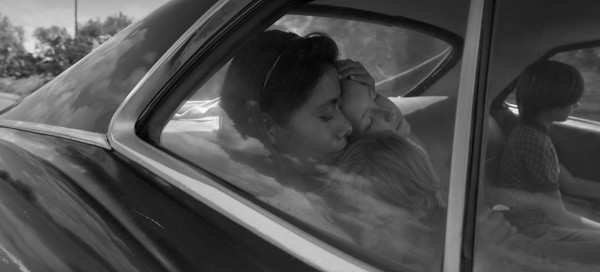
YALITZA APARICIO (LEFT) IN ROMA
Grandeur and helplessness in a portrait of Seventies Mexico City
ROMA won the top prize at Venice this year, the Golden Lion. This black-and-white film is an autobiographical memoir, intimate yet detached, of a bourgeois 1970's Mexico City family and their two maids, and some notable public events. Some are calling it a "masterpiece" yet Cannes didn't get it due to their feud with Netflix. This helps explain that it debuted and got the big prize at Venice; but Venice, not Cannes has always been home for Cuarón. It's Cuarón's first film since the 2001, also Venice-awarded, Y Tu Mamá También to be set in his native Mexico and maybe his best since that one. He wrote it, shot it, and edited it besides directing it. The result is brilliant and quietly shattering.
Roma's title refers to the posh middle class neighborhood of Mexico City where the film is set and Cuarón himself grew up. The sociological and archeological focus of the film is indicated by the fact that Cuarón built elaborate indoor sets of whole streets of Mexico City and whole avenues to recreate what the city and that neighborhood were like in 1970-71, the time of the story. The detail of these slow-pan portraits and the grandeur of the big sequences make it especially ironic that this film was sold to Netflix. Happily I was able to watch it on a very large screen, in Alice Tully Hall at Lincoln Center in the middle of the orchestra - a setting like the big old Mexico City movie palaces featured in the film itself where at one point the kids see an astronaut movie.
Cuarón himself proves a more restrained, less intimate cinematographer than his usual dp Emmanuel Lubezki, who likes to swirl around his subjects, a technique that came into its own five years ago in the director's last film, his own technically masterful astronaut movie, Gravity, whose seven Oscars let the filmmaker pick and choose his next project. Cuarón prefers medium shots, avoiding closeups at times when you might expect them, using slow lateral pans as serene transitions between scenes. The neutrality of the soft black and white also serves to distance us while nonetheless dazzling us with the clarity of its 65mm images.
Roma is more structured by big moments of unexpected drama than by a storyline. Big things happen, but there is no connected chain of events. This fits with a sense of helplessness brought about by placing women at the center. The two important men do their damage in absentia. The doctor husband goes on a fake trip to Canada and never comes home, removing his property and shelves full of books from the big messy house later unseen while the rest of the family is on an imposed "vacation" trip to the seaside at Tuxpan. The man of humble origin who gets the maid Cleo pregnant, Fermin (Jorge Antonio Guerrero), is an exhibitionist who explains to her that he has risen from the barrios by mastering martial arts. Later it appears he has joined a sinister right wing militia. He turns up three times and each time it is vivid and unnerving.
If one feels neutral and also helpless while watching, this most fittingly expresses the nature of the film's single most important character, Cleo (Yalitza Aparicio), the main family servant along with Adela (Nancy Garcia), both of whom are of indigenous and rural origin and talk to each other in a Mixtecan language. For the four children (whom one never gets to know) Cleo is family, their essential comfort, who puts the youngest (who does have some cute lines of dialogue) to bed at night exchanging heartfelt "I love you's." The movie is dedicated to Cuarón's own family maid, who is still around and who he said wept all through when she saw it.
Roma is rich in intimate scenes particularly between Cleo and the children. There is also the cruel intimacy and horror of the hospital where Cleo gives birth to a dead child, an event never so vividly and pitilessly seen on screen. Or the cute scene where the smallest boy lies back on the roof saying he's dead, and Cleo lies with him, her head touching his, saying she's dead too. There is the mundane or silly intimacy of Cleo sloshing water all over the tiles to clear away dog do in the opening credits, or of the household's wife and mother, Sra. Sofía (Marina de Tavira), and her terrible driving - though one can sympathize with her inability to steer the big Seventies American car into the too-narrow house carport.
But there are also the big grand scenes that fit with the grandeur of the production. The family visits a vast country house where hunting prevails and incredibly, the heads of generations of family dogs are mounted on the wall. A big fire outside is put out by campesinos. Student demonstrators riot in the street, then some take refuge in a furniture store and are pursued by right wing thugs with pistols shooting to kill. The mother and children go to Tuxpan where two of the children almost drown off the Playa and Cleo, though she can't swim, saves them. It's not Cleo and the children who dominate the screen in this climactic sequence but the huge roaring waves. In a hospital, there is an earthquake - though this sequence mixes the grand and the intimate, because it focuses on Cleo looking at the newborn babies. Typically for her, she stands mute, unable to do anything. There's a paradox about the maid's status. She is both indispensable and powerless. Cleo survives because Sra. Sofía stands by her. Sra. Sofía survives, and she and the children and servants and grandma Sra. Teresa (Verónica García) stay on in the house, because the social system and the economics of the time protect them, though Sra. Sofía has to go to work.
Any class system like this has inherent contradictions and so the film gives out mixed signals, in a way. It is both a critique of the world of male domination and inexorable class differences and nostalgic for aspects of life lived there. This mixture explains why Owen Gleiberman's Variety review describes Roma as "shimmering yet remote" and says Cuarón "puts us in close quarters with his characters" while "staring at them from a beatific and nearly abstract remove." This is my own impression. Roma is nostalgic and poetic at times but we don't get to know the characters all that well, and those qualities are brought to ground by the elaborate production, detached visual style, and documentary-like "neorealist" clarity. While greatly admiring the skill and sweep of this film I couldn't help feeling a more humanistic version of events would have emerged from much simpler means, the kind of means that sufficed for Y Tu Mamá También.
Roma, 135 mins., debuted at Venice and won the Leone d'Oro and SIGNIS Award, and showed in over a dozen other major international film festivals including Telluride, Toronto, Busan, Mill Valley, London, and the New York Film Festival, as part of which it was screened for this review (6 Oct. 2018). Curón having been called away, Benicio del Toro gave a rousing introduction to the film, declaring it to be not only Cuarón's best but number five of his own five favorite films. US release date: 14 Dec. 2018. Metascore: 95.
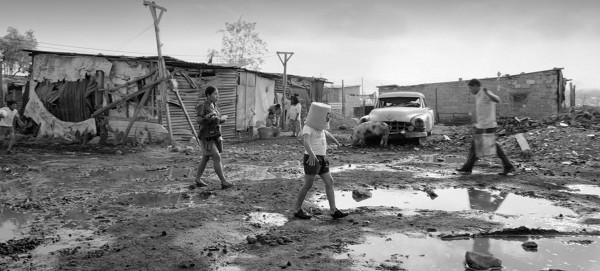
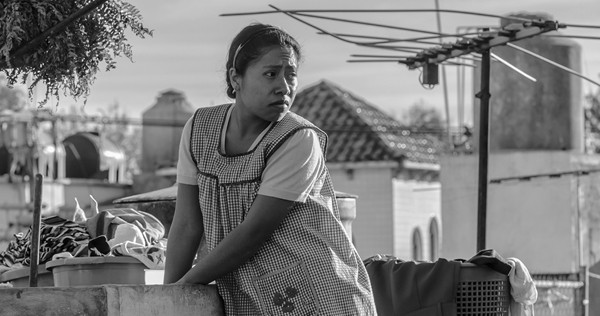
NANCY GARCIA IN ROMA
Last edited by Chris Knipp; 10-06-2018 at 08:04 PM.
-
A FAITHFUL MAN/UN HOMME FIDÈLE (Louis Garrel 2018)
LOUIS GARREL A FAITHFUL MAN/UN HOMME FIDÈLE (2018)
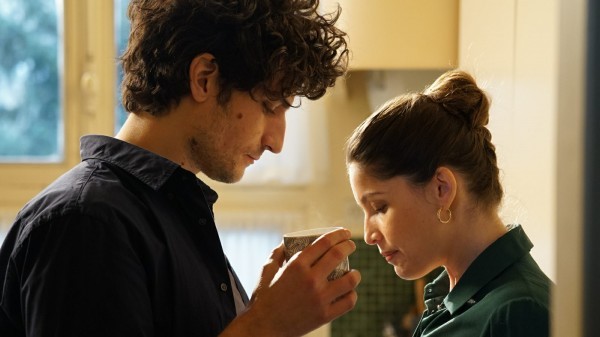
LOUIS GARREL AND LAETITIA CASTA IN L'HOMME FIDÈLE
Love and death: a quadrangle with a wise child
Louis Garrel's second film as director, co-scripted by the legendary Jean-Claude Carrière, is about a man (played by Garrel) whose girlfriend Marianne (Laetitia Casta) marries his best friend, then returns to him after her husband dies, but with the accompanying problems of a son who doesn't like him and troubling rumors about the husband's death.
In the opening, set earlier, Marianne gives Abel the bad news that his best friend Paul is the father of the child she's pregnant with, and she is choosing him over Abel. Abel walks out of her life not to return till nine years later.
Now Paul is dead, died in his sleep, it's said, and Marianne invites Abel - who's available - to come and see her. He meets her son, the nine-year-old Joseph (Joseph Engel). A pretty, self-assured boy he at once takes Abel aside and tells him "My mother killed my father." "How?" asks Abel. "Poison," says Joseph. This is a very choice scene, a little triumph that will stick in your mind.
Abel looks bemused, and we may laugh, but it's an arresting conversation that conjures up Highsmith filmed by Chabrol - or Hitchcock, whose murders often have humorous moments. You may say Joseph says this stuff to scare Abel away and have his mother to himself. But wait till you learn more about Joseph. The boy is an expert at solving mysteries and crime is his chief hobby. He's spent time with actual police and learned from them. Maybe he will grow up to be Chabrol, or Ozon. Or maybe this is just a joke. But not to Abel, who when Marianne serves him a hot tizane, eyes it nervously and only takes a sip.
The conversation between Joseph and Abel goes further. Marianne's own doctor, we learn, filled out the death certificate for Joseph's father without ordering an autopsy. Why was that? Abel asks Joseph. "My mother slept with him," he replies. He, Joseph, can't remember the doctor's name but it's the name of a flower, beginning with P. It takes Abel a while to think of the right flower, peony. And he goes and talks to Doctor Pivoine, who tells him that he is gay. Pivoine is not gay, Marianne says, and Abel sees Pivoine with a girlfriend. Another droll and provocative sequence.
Did Marianne sleep with Pivoine? We never find out. But it's evident Joseph doesn't like Abel. No secret about that. He says so. Nonetheless Marianne takes Abel in to live with her, so Abel "steals" Joseph's mother, as he puts it to Abel later.
The film pitches us a new curve ball: Paul's younger sister, Eve (Lily-Rose Depp), who enters the picture to tell her story in voiceover. She talks of nothing but her love for Abel, who she says she's been mad about since she was a girl, carrying photos of him everywhere and thinking of him constantly. Now neither a girl, nor an adolescent, nor a virgin, she presents herself to Abel and declares her lust for him. She asks, and he admits, "physically" he indeed finds her very pretty.
Marianne herself suggests that perhaps Abel should try Eve, sleep with her a few times, just to see whom he prefers. This turns out to mean taking his things to Eve's little student apartment-room: Abel can't be coming back to Marianne's place every night during the process. It goes on for a while.
Till Joseph steps in again. He had reassured Eve earlier of her good prospects with Abel by telling her his mother and Abel were not having sex that much. He could prove it. He made recordings of them under the bed with his iPhone.
But then he turns Eve off to Abel with one of his little jaw-dropping pronouncements: "My mother told Abel to come to you," he says - which is true, of course. When Abel returns to Eve's flat he finds his things packed up and stacked outside the door.Things were not going that well anyway, for Eve. Whenever she had sex in the past, she always fantasized Abel. But when she has sex with Abel, who can she fantasize? She thinks the sex was better when it was inspired by Abel than is has been with Abel.
A discussion between Abel and Marianne reveals that she was sleeping with him and her late husband at the same time, and she doesn't know who the father of Joseph really is. Moreover, she really loved Abel more, but she wasn't able to choose between the two men and to do so, flipped a coin, and Abel lost. She regretted that, but the die was cast.
This a film as classically, quintessentially French as you could ever want, and Louis Garrel, who became a star with other directors, notably as the muse of Christophe Honoré, is steeped in French cinematic tradition with an actor grandfather and director father. Yet as Garrel has said, he does "terrible things" in this film. Isn't it taboo to mimic the French New Wave? Yet here in L'homme fidèle he has voiceovers, apartments, two women and a man, coffee - all the Nouvelle Vague stuff Godard, Truffaut, et al. are known for.
But he has this excellent cast, including himself, and this precocious boy of nine. Garrel himself is handsome in a very special way, is photographed as flatteringly as ever in his own films, and brings sexiness and wit and a light touch to his performance here that centers the film. Laetitia Casta, his real-life wife, is a memorable beauty with shimmering pale blue eyes. (In the Gainsbourg biopic she played Brigitte Bardot.) Lily-Rose Depp is the daughter of a famous French beauty and Johnny Depp. Here she is as fresh as a flower blooming in the rain.
The star of the show is Joseph Engel, though. Joseph is the pivot-point and premise of the film. It is his provocations that start the reverberations. Moreover, he isn't just a preternaturally wise, Shakespearean-style child - though at one point Abel declares that he doesn't know how to talk to children. Talking to them like adults isn't right. But when he talks to them like a kid that doesn't work either. In other words, he is no ordinary child. But he is a piece carved out of Louis Garrel's own past. Laugh if you want, it wasn't so funny for little Louis at the time.
At the New York Film Festival Lily-Rose Depp, Laetitia Casta, and Louis Garrel were all present for the Q&A, and Garrel talked a blue streak. His English was a bit halting years ago but now he is fully able to "se débrouiller," as the French say, he can "get by" very well, while a certain remaining roughness seems to free him to say franker or funnier things than might come out in French. At Lincoln Center, he was full of ideas and funny, and revealing, especially talking about himself as a child of divorced parents acting in one of his father's films when he was six, where his mother was in a scene sleeping with another man, and his father with another woman, and he wasn't dead certain what was fake and what was true.
About Joseph, Garrel said you need to remember that at nine a boy already "knows everything." He also admitted that he himself recorded his mother under her bed - like the boy in the film, to see if she was having sex.
L'Homme fidel is in some ways simpler, fresher, and more playful than a Nouvelle Vague film. It's also more precisely constructed and carefully paced than Garrel's directorial debut Two Friends, which had more frenetic activity and more improvisation. This is a puzzler that alludes to Marivaux, and also delves into Freudian aspects of childhood, while delighting in leaving questions unanswered. Its final scene, a silent one, has that aspect of classic comedy in that the three adults are all united, holding hands behind Joseph. He had disappeared, and is found again. This is a fluent, splendidly economical, elegant and delightful film that fulfills all the promise of Garrel's directorial debut and goes beyond it. Next perhaps as Jordan Mintzer says in his Variety review penned at Toronto, he should break free a little further from tradition and introduce more elements purely his own.
A Faithful Man/L'homme fidel, 75 mins., debuted at Toronto 9 Sept. 2018, also showing at San Sebastién, Zurich, and the New York Film Fesival, where it was screened for this review 7 Oct. 2018. It comes to French cinemas the day after Christmas.
Last edited by Chris Knipp; 04-08-2019 at 11:34 PM.
-
SHOPLIFTERSs/万引き家族 MANBIKI KAZOKU (Hirakasu Koreeda 2018)
HIRAKAZU KOREEDA: SHOPLIFTERS/万引き家族 (2018)
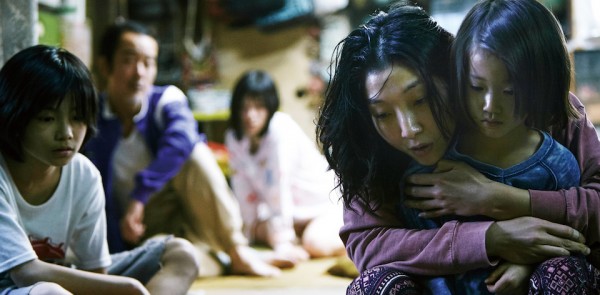
KAIRI JYO, LILY FRANKY (BLURRED), MAYU MATSUOKA, ANDMIYU SASAKI IN SHOPLIFTERS
Humanity under duress; unity in disorder
Koreeda's remarkable new film, one of his best, resembles his previous masterpiece, Nobody Knows, or Kurosawa's Dodaskaden, and may also remind you of Dickens' Oliver Twist with its school for pickpockets. But it's different from them in its focus on the ambiguous relationships of an ersatz "family" living outside the law and well below the poverty line. It clarifies some things at the end but leaves questions unanswered, its shifting, incremental story having taken up fixed residence in our heads. It teaches us things about poverty and morality under stress that most of us didn't know, or want to consider.
The "family" unit, who live somewhre in Tokyo, starts with Osamu (Lily Franky), a day laborer. His wife is Nobuyo (Sakura Ando). She works in a big laundry run like a factory. Her half-sister Aki (Mayu Matsuoka) strips for unseen clients in a sex shop. An old lady, Hatsue (Kirin Kiki), is drawing her late husband's pension illegally, contributing it to the collective "family" and also collecting money periodically from relatives. A bright little boy they call Shota (Kairi Jyo) has learned to shoplift in coordination with Osamu, who may prefer larceny to work, not that he has good prospects. They all live together in a little ramshackle hutch.
In an early scene Osamu and Shota are stealing food from a market, and on their way home they come across Yuri (Miyu Sasaki), a little abused girl left out in the cold. They take her in, and instead of reporting her to the police, as they should, they decide to adopt her. They feed her - eating being the group's most pleasurable shared activity - and they mend her wounds and later, Osamu and Shota teach her to shoplift.
But that description doesn't feel quite true to the movie's texture, because It constantly shifts around, weaving in other observations, remaining unexpected. What emerges is that everybody in the "family" pretty much has everyone else's back. And though Yuri is shy with everyone and about everyone (still preferring to remain, not go home), and Shota resists callng Osamu "Dad" or Nobuyu "Mom" as Osamu wants, simple family warmth pervades the little house.
Things change when the old lady dies and Shota gets caught stealing, bringing police and social workers in. Shifting gears then, the film provides snatches of interviews with each person. During the runtime of the film, "family" has gotten closer and closer, becoming like a real family, maybe better, because united by a simple life without cell phones or computers. But now things come apart. Masks fall away. It emerges that the adults were keeping up a front and concealing secrets, some of which were ugly. The "family" act enabled the adults to show perhaps a better side of themselves. But it was a sketch rather than a finished painting - set to self-destruct, like Banksy's little girl with the red balloon.
And thus Shoplifters becomes self-reflexive, a story about telling stories, a lesson in what powerful emotions a tinsel tale can evoke. Koreeda uses his background as a documentary filmmaker here, but he adds questions and statements that deepen his tale, retaining an offhand, observational surface.
Shoplifters won the Palme d'Or of the 2018 Cannes Film Festival, the first Japanese winner of the top prize since Shohei Imamura’s The Eel in 1997.
Shoplifters / 万引き家族 (Manbiki Kazoku, "Shoplifting family"), 121 mins., debuted in Competition at Cannes, and was shown in 27 other international international festivals, including the New York Film Festival, as part of which it was screened for this review. It was selected as the Japanese entry for the Best Foreign Language Film at the 91st Academy Awards. It opens in New York and Los Angeles 23 Nov. 2018. Metascore 93.
See Max Shilling's review and article on the film for Japan Times.
Last edited by Chris Knipp; 10-16-2018 at 02:23 PM.
-
COLD WAR/ZIMNA WOJNA (Paweł Pawlikowski 2018)
PAWEL PAWLIKOWSKI: COLD WAR/ZIMNA WOJNA (2018)
Love and war
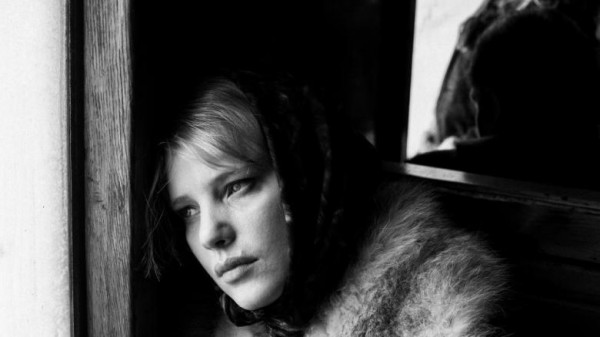
JOANNA KULIG IN COLD WAR
From the acclaimed director of the very fine 2013 Ida and similarly focused on Iron Curtain love and shot in crisp, beautiful black and white, a story people are finding even bleaker than its predecessor. A passionate love story between two people of different backgrounds and temperaments, who are fatefully mismatched, set against the background of the Cold War in the 1950s in Poland, Berlin, Yugoslavia and Paris. In Competition at Cannes, it won the Best Director award there and was a Palme d'Or nominee.
A visual dazzler that is also so packed with music you could call it a musical. It's in academy ratio, and a marvelous economy that impresses in this ear of overblown movies that go soft. The man, Viktor (Tomasz Kot) is a conductor, the girl, Zula (Joanna Kulig) is a promising young singer he takes a liking to at her first interview. This is also a portrait of Polish Iron Curtain folk music propaganda. The group we follow around is powerful nativist propaganda. The artistic leaders resist the bureaucrats' request that they introduce political, pro-Stalin songs into the touring show. They lose.
Pawlikowski works in bold units jumping forward in time, like dealing out cards from a deck. Some of the earliest shots are so beautiful and rich in tonalities they're like stills. And the final shot is one of the most beautiful of all, and the darkest and saddest. Along the way, the precise recreation of period and costumes would seem mannerist if the scenes were not so deft and powerful. Many shots of groups of men look like photos of Soviet-era crowds down to the last button. But the music is nearly as powerful an impression as the image, if not more so.
There are various types of real and pseudo slavic film music and cold war propaganda ditties, and there is jazz, and French chansons, rock and roll, and the final credits roll over Bach's GoldBerg Variations. The lustiness and power of a cappella singing in the early sequences is overwhelming. It grabs you by the throat. It's hypnotic. And a little comical.
The action hinges on defection. Viktor and Zula are having a mad affair, and the group they're in is so successful it's getting plum tour assignments. When they're in Berlin he proposes that they go over to the western side, and he argues her into agreeing. But when the evening comes, he waits for hours with suitcase and cigarette and she does not come.
And so the mad affair ends. Only it doesn't. But there is a gradual understanding that they can never be happy, either in their lives, or with each other. He goes to Paris, and becomes involved with a French woman poet, Juliette, played by Jeanne Balibar (I half expected her to be the singer Barbara, whom she played so well in Mathieu Amalric's recent film). Zula eventually comes to Paris. She has her own man now. But it's understood that she and Vikor must reunite, and they do. But Zula finds fault with Juliette's poetry, which Viktor wants to use in an album Zula will make in Paris. (She sings it anyway.) She thows away the album as "trash."
Zula thinks Viktor in Paris is no longer a man. They live in a large loft with a big mansard roof, classic. One of the almost nonstop arresting sequences - they are arguably so numerous they overwhelm the film and make it more like a pageant - is at a club where Bill Haley and the Comets' "Rock around the Clock" plays at top volume and Zula dances with multiple partners, while Viktor sits impassively by. Yet another style of music, coming right after pseudo Mexican, and another arresting scene of virtuoso intensity.
Viktor cares so much for her he is willing to go back to Poland, where he is found guilty of multiple crimes and goes to jail sentenced to fifteen years. But strings are pulled and he gets out. Then, they go to Greece, and to the other side. What will Pawilikowski do next? One wonders.
Tomasz Kot might be ordinary looking except that he's so tall. He never droops, despite Zula's occasional disapproval. Joanna Kulig is the star, a variable woman who can look beat up and exhausted one moment and dazzling and beautiful the next. One expects surprises from her after her first appearance. She projects triumph and insecurity in equal measure, a troubling presence. With her one enters a world of the dangerous and unpredictable. A world of the Cold War era Pawlikowski has made his own, at least for now. Pawlikowski certainly knows how to make movies. At the NYFF Q&A with Kulig, speaking perfect English, he seemed almost matter of fact.
Cold War, 88 mins., debuted as mentioned at Cannes and won the Best Director award. AT least 30 other festivals are listed on IMDb, including Toronto and the New York Film Festival, screened at the latter for this review. The US theatrical release is scheduled for 21 Dec. 2018. Metascore 90.
Last edited by Chris Knipp; 10-09-2018 at 09:35 PM.
-
ASH IS PUREST WHITE/江湖儿女 (Jia Zhang-ke 2018)
JIA ZHANG-KE: ASH IS PUREST WHITE / 江湖儿女 (Jiang hu er nv) (2018)
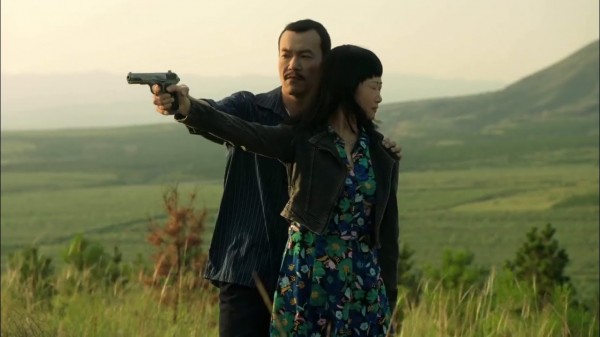
LIAO FAN AND ZHAO TAO IN ASH IS PUREST WHITE
Gangster love in modern China
A "gangster epic," some call this film. But more than that it's a love story, heavy on the disillusionment and survival and light on the romance. Epic in feel it nonetheless is, with its panoramic vision of survival and transformation in 21st-century China. It starts in 2001 and ends somewhere near today, where people are compulsively filming each other with their smart phones. Riveting, strangely reminiscent at times of Wong Kar-wai and clearly referencing some of Jia's earlier films, especially Unknown Pleasures and Still Life (and his first foray back into gangster territory since A Touch of Sin). There are also homages to John Woo. This is a reconsideration of the romantic heroine of those two films and its two parts are set in their respective settings, the towns of Datong and Fengjie. Organic and intense yet calm, Ash shows a master filmmaker at the top of his powers.
At the center and nearly always on screen is Jia's muse and wife Zhao Tao as Zhao Qiao, owner of a little bar (with Mahjong) where she falls for a local gangster with an air of authority, Bin (Liao Fan, of Diao Linan's neo-noir Black Coal, Thin Ice). We don't see him doing much gangstering, but there is violence, off-screen and on. Bin talks recurrently about being Jianghu, and for the non-sinologist that seems to mean, maybe, trouble with moral values (see Maggie Lee's more informed Variety review for specifics). It sometimes may mean panache, sprezzatura; other times, duty and resignation. Anyway Bin is a provincial Datong gangster, a big fish in a small pond whose many "brothers" clearly show him much respect at the little mahjong club.
In the first scene Bin takes out a pistol, and Qiao handles it. We hear of a businessman, probably shady, but without known enemies, being murdered after a sauna by young toughs. Violence on screen is sudden: quickly two similar aspiring young tough guys attack Bin with a metal pipe and badly damage a leg. He lets thems off easy when they're identified and brought to him. (Turns out they hit the wrong man. Beginners' bad luck.) Later, Bin, looking posh, is riding with Qiao in a chauffeured car and the violence ramps up. He jumps out of his car to counter-attack a crowd of thugs in a brutal and physically specific street battle where at first he is winning, then very much not, and she steps out and saves his life with that pistol. They both go to jail. He gets out years sooner, but Qiao is released he isn't at the prison gate to meet her. She begins an odyssey in search of him.
This man and woman are more completely at the center than the figures in Jia's 2007 Still Life but this new film refers to the same great upheavals, particularly the decline of a mine industry and the displacement of 1.4 million people for the Three Gorges dam. There are several train trips that provide a sense of the dizzying shifts in population, industry, business that are the China of this period. In Jia as maybe with any great filmmaker genres don't mean anything. If this is a muted gangster tale as well as a disillusioned romance it's also a haunting vision of socioeconomic upheaval. Disco seems to have come late to China: there's an intense, rousing sequence of a massive crowd dancing to the Village People's "YMCA." There is a strong thread of humor and one is the snappy dance duo who appear here later turning up with sublime absurdity to perform at a gangster elder's funeral.
All that is prelude, though essential. The part that counts is Qiao's trip to Fengjie where she's heard Bin is, and she has his number in her cell but he's not answering. Like a picaresque hero she loses everything on a boat ride but uses clever scams and deceptions - why didn't we know she had them in her? - to restore funds and force Bin, who is dodging her, to explain himself. In this most compelling and personal section Qiao, as Maggie Lee puts it, "takes charge of her life with the desperation and resourcefulness that make her an icon of the Chinese can-do spirit." .Later both she and Bin are transformed and there are more train rides, one with a mesmerizing charlatan touting his travel or tour agency, he hasn't decided what but he's seen aliens. Qiao hooks up with him for a little while. Then she and Bin are together, for longer. But nothing lasts. The sense of personal emotional saga and richness of texture could not be better.
Important in the success of this masterful film is the sometimes fatalistic score, and the European team of dp Eric Gautier, who make the transitions from DV (in Academy ratio) to Digibeta, HD video, film and Redweapon cameras seamless and suggestive.
Ash Is Purest White /江湖儿女; Pinyin: jiānghú érnǚ ("Sons and daughters of Jianghu"), 137 mins., debuted in Competition at Cannes including Munich, Jerusalem, Toronto, New York, Vancouver, Busan, Mill Valley, London, recut for Toronto. It was screened for this review at the New York Film Festival, 10 Oct. 2018. MK2 is the producer.
Last edited by Chris Knipp; 10-11-2018 at 11:39 AM.
-
ASAKO I & II /寝ても覚めても (Ryūsuke Hamaguchi 2018)
RYUSUKE HAMAGUCHI: ASAKO I & II/寝ても覚めても NETEMO SANTEMO ("At all hours") (2018)

ERIKA KARATA AND MASAHIRO HIGASHIDE IN ASAKO I & II
Wavering
The director had made seven features and documentaries since 2007 when his five-hour Happy Hour (ND/DF 2016) three years ago gained him international attention, and that helped him jump right into Competition at Cannes with his new film, Asako I & II. Adapted from a novel of the same title by Tomoka Shibasaki, it's about about a young woman torn between two identical-looking young men, one rakish and wild, the other reliable and conventional. The contrast is itself a very conventional one. A similar theme was treated (in a sexier, more provocative way) last year by François Ozon in Double Lover. Ozon was playing to a grownup taste in thrillers and S&M. Depending on how you look at it, Hamaguchi's take is delicate and mysterious, or bland YA rom-com stuff.
There is fun in observing the game either way, Ozon's way or Hamaguchi's way, of a woman being pleased or tormented by an attractive man. In Ozon's case it's the elegant former model Marine Vacth and the seasoned Belgian actor Jérémie Renier, who got his start with the Dardenne brothers. In Hamaguchi's, it's the tall, thin, delicately handsome Masahiro Higashide, who plays both the sexy, undependable Baku of Osaka and the conventional, reliable, less exciting Ryohei.
It's fun to admire Higashide's looks in both roles, and the two performances are in more subtle shades of difference than those imposed on Jérémie Renier by Ozon. Not that Higashide doesn't look quite unlike Baku when he turns up as Ryohei. Baku has a wild mop of hair and bohemian attire of jeans and flip flops; also, according to Maggie Lee's Variety review, as Baku he speaks in a broad Osaka dialect (they meet there; she meets Ryohei in Tokoyo). Ryohei is a young salaryman (he works for a brewery) in standard suit and tie uniform. The different look makes all the difference. The actor does a good job with it.
The trouble is that Asako, as played by Erika Karata, is the same passive, doll-like young thing with both men, and her indecision, which Lee calls "banal," just seems silliness, or very poor judgment. If only she were in the grip of something complex and compelling; but she doesn't seem to be. A less recognized unwisdom, we might say, is that of Ryohei, who gathers early on that Asako's attracted to him because of his resemblance to another guy, but goes on despite this to fall in love with her. We may want to forgive him because he's basically a a decent and reliable chap. But Asako isn't the only foolish one.
We don't really see much of Baku - he isn't around for that long - and some audience members, seduced by his attractiveness, may find him dreamy, as Asako does, but he can easily be seen as a narcissistic doofus - which his later reappearance turned into a supermodel does nothing to dispel. Asako's friends warn her right off that he's an unreliable seducer. The trouble is telegraphed to us right away when he goes out for bread and doesn't come back till the next day.
Nonetheless they fall in lust, with heavy kissing, even after they've crashed a motorcycle and are lying sprawled on the highway. Months later, the affair ends when he goes out to buy shoes (to replace those flip flops, no doubt) and disappears. She's so devastated she moves from Osaka to Tokyo. With Ryohei, it really lasts, Asako sets up domestic life in an apartment overlooking a river, and they're together that way for five years. But her "thing" for Baku never goes away, it turns out.
As in Happy Hour, what's interesting is the ensemble scenes, when Asako is with friends, or friends of friends. There's a notable exchange - also maybe a sign of Hamagushi's tendency to go off on a tangent - when Ryohei brings Kushihashi (Kôji Seto), a work associate, to Asako's to meet her best friend Maya (Rio Yamashita), who is an actress. Kushihashi (turning out to be a frustrated actor himself) launches into a vehement, pointedly rude attack on her acting style, which he then abjectly apologizes for. Hamaguchi interpolates a sequence of the massive 2011 Japan earthquake (not in the novel; but he made a 2012 documentary about it, The Sound of Waves). These surprises add interest, as do the secondary characters.
But the film keeps coming back to the conventional contrast between the two men and Asako's immature behavior. Stephen Dalton in his Hollywood Reporter review calls her an "annoying airhead" who "would not pass even a basic Bechdel Test." That is to say, all she ever talks to other women about is men. Anyway - and this criticism applies to Ozon's Double Lover - the whole story hinges on a fantastic conceit and the focus becomes the conceit - or how Masahiro Hirashige plays the two contrasting roles - rather than on human relations. The kind of keen, specific observation we got in Happy Hour is too often missing here. Let's hope Hamaguchi will go on to better justify his new international recognition.
Asako I & II/寝ても覚めても NETEMO SANTEMO ("waking or sleeping"), 119 mins., debuted in competition at Cannes; eight other international festivals including Taipei, Toronto, Vancouver, and the New York Film Festival, where it was screened for this review 7 Oct. 2018. Metascore 62.
Last edited by Chris Knipp; 04-08-2019 at 09:33 PM.
-
TRANSIT (CHristian Petzold 2018)
CHRISTIAN PETZOLD: TRANSIT (2018)
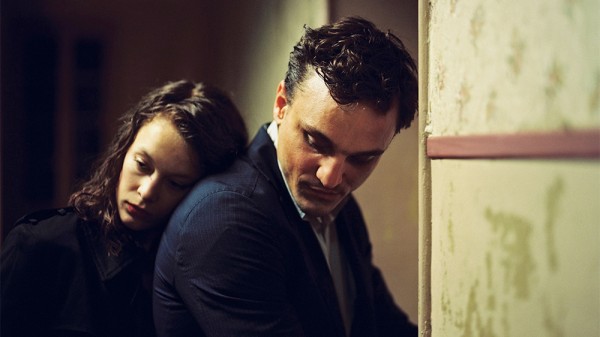
PAULA BEER AND FRANZ ROGOWSKI IN TRANSIT
Loneliness, fear, loss, alienation, suicide, fluid identity in a war story out of time
When a man flees France after the Nazi invasion, he assumes the identity of a dead author whose papers he possesses. Stuck in Marseilles, he meets a young woman desperate to find her missing husband - the very man he eventually turns out to be impersonating. Christian Petzold casts Franz Rogowski and Paula Beer in his adaptation of Anna Seghers' novel Transit Visa, set in the 1942 Marseilles zone libre (free zone). What he does with the source is strange and intriguing, and creates a memorably haunting mood if you give yourself to its peculiar mysteries. My faithfulness to Petzold remains, even when he's working without his muse, Nina Hoss (he finds a good equivalent in Paula Beer). This is a distinctive, difficult, but potentially very rewarding film.
"There are those who treat melodrama as a dirty word" wrote Guy Lodge in Variety, "but no working filmmaker gives it a cleaner, crisper reputation than German auteur Christian Petzold, whose extraordinary anti-historical experiment Transit nonetheless registers as his most conceptually daring film to date." "Anti-historical experiment" because Petzold tells Seghers' Forties story with a contemporary background (but without ultra-current details like smart phones).
Petzold has drained the specifics of the World War II and Holocaust-related content from the material of the source novel, which is of its period and none other. The replacement semi-contemporary recreation allows connections between refugee horrors of World War II and the new ones of today, which for the first time are just as bad, with a new global pointlessness and complexity. I refer the reader to a Wikipedia plot summary (which is rather general) for the outlines.
Georg (Rogowski), "Germany’s Joaquin Phoenix," has the remnants of a split lip, a slight lisp, a taut intensity. We don't know quite what he's fleeing, while Seghers' protagonist was a concentration camp escapee. . But the WWII fugitives in Marseille, whose time was running out, as here, he seeks permission to sail to another country that will be haven. For a while he bonds with a little boy, an aspiring soccer star whose penchant he encourages. This activity best fits with the incongruously cheery, sunny Marseille exteriors. The boy has only a mute mother with whom he communicates in sign language and wants Georg to stay around; feels betrayed when Georg says he must leave. Georg later returns to their flat and they are gone; it's packed with exotic refugees.
This is a diversion, anyway. The main storyline focuses on the American consulate and the people Georg encounters there, including a woman with a pair of fancy dogs she'll be rewarded with safe harbor for bringing to South America. (That ends badly.) And there is Georg's uneasily intimate connection with the fate of a writer he's supposed to help out, Weidel. He's shown a bloody bathroom, and learns Weidel is dead by his own hand. Papers that fall into his hands, meant to go to Weidel's wife Marie (Paula Beer), eventually enable Georg to take on Weidel's identity and permission to travel. But as he comes to be in touch with Marie, he's also enmeshed with a doctor named Richard (Godehard Giese). . .
Everyone's fate and plans are in flux, and as Georg falls in love with Marie, he becomes more eager to sacrifice his own future to satisfy her dreams, deluded though they may be. Petzold takes us into a world of extraordinary pressures and fluid identities.
The fact that the film is ahistorical will alienate viewers, but also enables Petzold to create something both hauntingly Kafkaesque ("a remake of 'Casablanca' as written by Franz Kafka" David Ehrlich of Indiewire called it) - as well as a film close to the melancholy, ruminative WWII material of French 2014 Literature Nobel Patrick Modiano. It takes a while to figure out what's going on in Transit - and one of the story's characteristics is that the people don't know what their plans are, either. This is a film some will hate, and others love. If it's the latter outcome for you, this style-drenched, plot-neutral film may reward repeated viewings.
Transit, 104 mins., debuted at Berlin Feb. 2018, showing in about a dozen other international festivals, including New York, where it was screened for this review as part of the Main Slate 14 Oct. Metascore 72.
Last edited by Chris Knipp; 04-03-2019 at 06:27 AM.
-
THE TIMES OF BILL CUNNINGHAM (Mark Bozak 2018)
MARK BOZAK: THE TIMES OF BILL CUNNINGHAM (2018)

More details about the ultimate street recorder of New York fashion
This film is entirely built around an interview Mark Bozek filmed with Bill Cunningham in 1994. It ends when the film ran out. He decided to make a documentary around the interview when Cunningham died in 2016 at the age of eighty-seven. We don't know what became of this valuable film originally, but it was shot when its subject had received a Media Award from the Council of Fashion Designers of America.
This film shows a series of snappy photos purported to be of his millinery productions, and they are marvelous, and astonishingly various and numerous. Let us shed a tear for this vanished art, and wonder at the customers of "William J." (his business name, to hide it from his disapproving family), which included Marilyn Monroe. This came after a tour of duty in Europe in the Army that allowed him frequent side trips to Paris to see the fashion shows. Bozak provides glimpses of this period, too. As filmmaking, The Times of Bill Cunningham is only workmanlike, but it's still invaluable for the wealth of visual and audio information it provides.
The interview film is up close and bright. It's shows its subject's fresh innocence and energy vividly. You can see the spots on Bill's face from his days outside, hear his eager laughter. The shy, ebullient, boyish Bill is so modest he begins by dismissing the whole idea of being interviewed. He thought what he photographed was important, he himself a zero. He is by turns gushy, modest, and emotional. As the interview goes on, Bill provides an extraordinary amount of information about his life, which Bozak has illustrated and supplemented with stock footage, still and in motion, which he got access to through Bill's niece, Trish Simonson - access crucial to the film. Bill's own words are occasionally supplemented by narration by Sarah Jessica Parker. He was so distant, so odd, so focussed and intense, and though intensely friendly, socially limited. Could he have been on the spectrum? Anyway, he lived like a pauper, but he was royalty.
There are shots of his parents and his brothers and sisters. Strait-laced Boston Catholics, they didn't like his first love, designing hats, and were pleased when he discovered street fashion photography and gradually morphed into a cultural photojournalist, the most prolific and dedicated of them. "We all dress for Bill," the longtime Vogue editor famously said about him. Well, if we are interested in the immense range of stuff that happens on the street with clothes, we all care about Bill, his own designer gifts, his austere life, his free-ranging of Manhattan on multiple bikes, one of which seemed to get stolen every year. This and other facts, like the Légion d'Honneur and the Nineties adoption of the blue French workman's jacket, were already covered in Press's film.
To begin with we get another glimpse of where Bill lived on the cheap for so many years, his zen monk-ish room without bath in a since closed residential wing of Carnegie Hall. Richard Press's 2010 Bill Cunningham New York (ND/NF) brought us up to date on this situation, where, on the closing of the residential wing, an apartment was found for Bill overlooking Central Park. Here, we learn some more about that residence, and who lived there. We didn't know Marlon Brando dossed with Bill for a while when escaping from women fans.
The interview goes particularly into Bill's close friendships with Nona Park and Sophie Shonnard of Chez Ninon and how important they were for fashion at the time.
Bozak doesn't pry into the shy Bill's private feelings. In Press's film he enigmatically nods to being gay, but one might wonder if he went through life a virgin. What is clear is that in 1994 he collapses into tears instantly when asked about sad things in his life and he comes to AIDS and talks about the immense loss of creativity that scourge meant particularly in the fashion world, including so many, like Willi Smith, Perry Ellis, Halston, Patrick Kelly, Antonio Lopez, that Bill would have known. As a 2013 NYTimes piece noted, AIDS deaths, especially in the mid-seventies and early nineties, in certain gay-dominated "fields of enormous creativity and change — from art to fashion to literature — were devastated, never to recover completely." Bill Cunningham knew this. He was in the midst of it. To see this happy man suddenly so moved to tears he cannot speak is the most stirring moment of Bozak's film. We learn that Bill photographed many things (and kept the shots in his voluminous files) without publishing them, including images of the Gay Pride parade from its inception, and many years after.
But the message Bill gets to reiterate so often if finally rings out is this: he did not claim to be a photographer, like Cartier Bresson was one, but a recorder of street fashion, and that fashion was to him the true fashion, not what the designers produced but how real people wore the clothes. His life was austere and restrictive, and his shyness, he admits, sometimes made it hard to go out to the streets he seemed to dominate. But he clearly never lost his passion for the new and his gift for finding it. The austerity provided him the freedom, and he emphasizes that he could, and did, go anywhere he wanted to shoot his pictures. Cartier Bresson would not have disapproved.
The Times of Bill Cunningham, 74 mins., had its world premiere at the New York Film Festival 11 and 14 Oct. 2018. It was screened for this review.
US theatrical release finally coming 14 Feb. 2020 (New York) and 21 Feb. (Los Angeles), wider release to follow.
See: "Bill Cunningham Left Behind a Secret Memoir,"

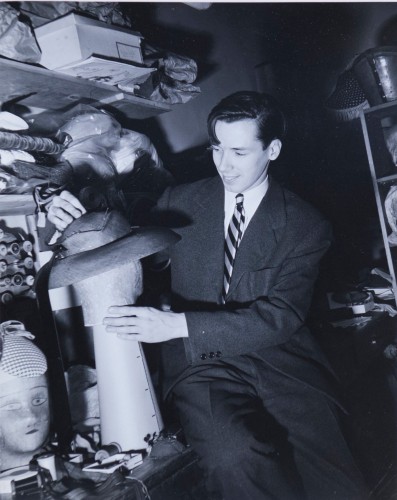 NYTimes 21 Mar. 2018.
NYTimes 21 Mar. 2018.
Last edited by Chris Knipp; 01-30-2020 at 10:15 AM.
 Posting Permissions
Posting Permissions
- You may not post new threads
- You may not post replies
- You may not post attachments
- You may not edit your posts
-
Forum Rules



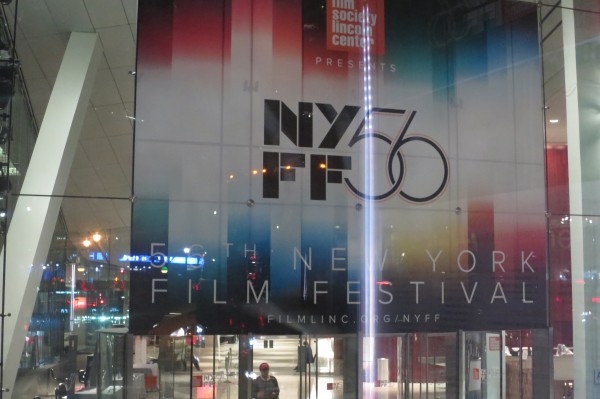
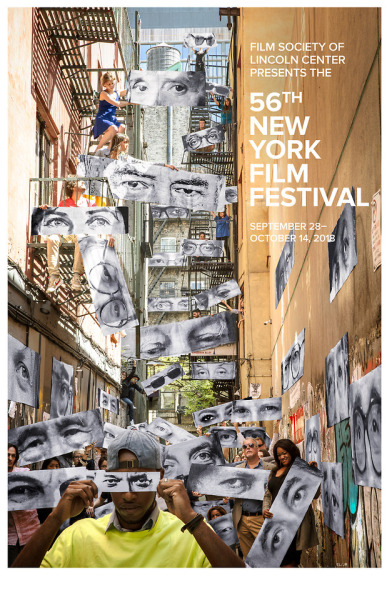

 Reply With Quote
Reply With Quote
















 NYTimes 21 Mar. 2018
NYTimes 21 Mar. 2018
Bookmarks